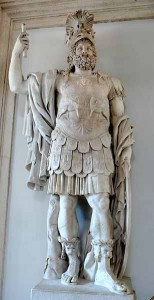
Mythology can be seen in many aspects of our lives from the names of the months to the stories we tell our children. Even the days of our week, words that many of us use daily, are remnants of these past gods and their influence upon the world.
This will be posted on a Tuesday. A simple word that probably resonates more to you as the second day of the workweek than an old homage to the lost gods. The real story, however, relates Tuesday with the Roman god Mars. Mars, or Tiw in Old English, is the Roman god of war, and second in the pantheon only to Jupiter. Tuesday (Tiwesdæg) is a reminder that Mars was always watching with his spear raised, and that you only lived in peace because you won the war.
Next we look at Wednesday. Wednesday was named after WÅden, the Old English equivalent of the Norse god Odin. WÅden and Odin both of whom gain their origins from the Roman god Mercury, who is the messenger of the gods. His appearance was very close to that of Hermes to include the winged shoes and the herald’s staff. He is attributed as being a psychopomp, which is a being who guides the dead to the afterlife. There are even stories of Mercury bringing dreams to people as they slept.
Thursday is probably easily recognizable these days as remembering Thor, the Norse god of thunder. Thor is well known for his giant hammer, Mjolnir. This hammer had the ability to return to Thor’s hand when thrown. Even with all his power, he wore a belt that doubled his strength. He is known for his temper and was a dangerous warrior. Thor was a favorite god among the working class. Many wore necklaces of Thor’s Hammer and asked him for blessings of fertility.
Friday was named after Freya, the Norse goddess of sex, beauty, love, and fertility. She was awesome. She was beautiful, a leader, and she had a chariot pulled by cats! She owned an amazing necklace that was coveted greatly and a cool falcon feather cloak. Back in the day, Friday was considered a lucky day. It was a day to get married, have children, plant crops, etc. This was all due to the blessings the goddess would grant on her day.
Of all the days of the week, Saturday is the only one that maintains its Roman origin. Saturday is named after Saturn, the Roman god of agriculture and harvest. Saturn’s influence can be seen in Roman lore as a golden age, or time of abundance, among men.
Sunday, named for the Norse goddess Sunne (or Sunna) also known as Sól. Sunne rides across the sky in her chariot pulled by the horses Allsvinn and Arvak (meaning “Very Fast” and “Early Rising”.) Sunne is said to be pursued by a wolf named Skoll. (In fact, Eclipses are said to be the cause of the wolf getting close enough to take a bite out of the sun.) Sunne will continue until the Ragnarök, the “end of days’ for the gods. During Ragnarök, many of the gods, such as Odin, Thor, Tyr, Heimdall, etc, will be killed. Sunne herself is said to be finally caught and consumed by Skoll. Once this happens, Sunnes daughter will take her place and provide sun to a new world of peace and love.
And we’ll end with a beginning. Monday gets its name from the old English MÅnandæg, or Moon day. The Greek Goddess of the moon is Selene, or Luna to the Romans. She is depicted as a beautiful woman with long black hair. She rides across the sky in a silver chariot that is pulled by either a pair of horses, a team of oxen, or even dragons. She is well known for her love affairs, including one with Zeus, the king of gods. Selene is a favorite among poets and authors for the love of the moonlight.
So, what does this have to do with writing? Looking at the history and myth behind simple words we use to tell what day of the week it is does more than tell a nice story, it adds depth to our world. You can take one word and link it back to centuries of people and gain an understanding of how their minds worked. As you build your worlds, maybe you should take some time and look at how the past has influenced and defined the people and their beliefs. It can be the little things that not only provide a little bit of depth and dimension to your world, it can be a fun exercise to get your ready for writing in a new world.
